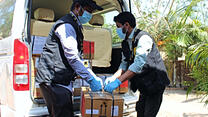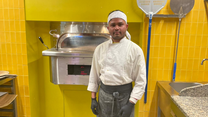Mohammad, 29, remembers exactly when he began to lose his vision. When he was 10 years old, his right eye turned red and watery and began to swell up. At some point, he stopped being able to fully see out of his right eye.
Living in Myanmar, he was unable to continue his studies because of his vision problem, and he resorted to working as a brick kiln worker.
When violence escalated in Myanmar in 2017, Mohammad became one of hundreds of thousands of Rohingya refugees who fled to Bangladesh, eventually ending up in Cox’s Bazar. With nearly 1 million refugees, Cox’s Bazar is home to the world’s largest refugee camp, where basic services are stretched beyond their limits.
In Bangladesh, Mohammad’s left eye began to lose its vision, and he ended up getting surgery on both of his eyes at the National Institute of Ophthalmology & Hospital. At the time, his doctors gave him some medicines and told him to visit again after a month. However, the COVID-19 pandemic delayed his follow-up visit by six months, and by then, his vision in both eyes had deteriorated. The doctors told Mohammad that he would require another operation to try and restore his vision.
As a visually impaired Rohingya refugee, Mohammad was shunned and ignored by others in Cox’s Bazar.
“Because of my disability, I would face neglect and verbal harassment from members of my community,” he shares. “No one in my community used to respect me or even consider me a human. This lack of respect slowly made me lose all my self-esteem.”
He was also dismayed by how his son was being treated. “When my son would go out to play, he would also face harassment due to him being malnourished and being the son of a person with a disability. He would be called ‘blind man’s son.’ The verbal abuse would break his tender heart,” he says.
After noticing the mistreatment Mohammad was experiencing due to his disability, IRC volunteers encouraged him to join the organization’s Community-Based Protection (CBP) program. Supported by the European Union (EU), the program empowers refugees to raise awareness about the most pressing issues facing their community in Cox’s Bazar.
“A monthly meeting is held by the IRC where they hear from all the attendees about what kinds of problems they are facing in their camps,” says Mohammad. “They take in reports on the problems… and create a priority list based on which they create an action plan.”
During the meetings, six different topic areas are regularly discussed: safety and security, population movement, housing, access to basic services, gender-based violence, and child protection. Thanks to EU funding, the IRC trained Mohammad on topics like cyclone preparation, disaster risk reduction, and psychosocial support.
When Mohammad began leading awareness sessions in his community, he was gratified to see how it changed people’s perception of him. Whereas before they viewed him as a second class citizen, his role as a CBP volunteer leader allowed him to be seen as equal.
“[Joining the CBP program] has earned me respect from many people of my community and the harassment I faced has decreased tremendously…" Mohammad shares.
Smiling, he adds, “Now I truly feel like a part of this community. Feeling included makes me extremely happy. I feel like I serve a purpose and that increased my self-esteem.”
With the EU’s financial support, the IRC runs a primary health center and works in collaboration with the organisation Handicap International to provide referrals and rehabilitation for people with disabilities like Mohammad. The health center supports 8,000 Rohingya refugees and almost 15,000 people from the host community in Cox’s Bazar with primary care services, including in-patient and outpatient services, reproductive and maternal health care, nutrition assistance, and mental health support.
Mohammad hopes that the IRC will continue working with people with disabilities, so that more people can feel like they have a sense of purpose and that they belong to the community. He also hopes that he will regain his vision and even more so, that his son will get the nutrition support he needs to grow and thrive.
“My son is not as strong and capable as other kids of his age [due to his malnutrition]. So, I also want my son to get a higher education and get a good job so that he can lead his life properly. That would make me truly content.”
The International Rescue Committee partners with the European Union to provide life-saving support to people caught in conflict and disasters around the world. Our work funded by the EU enables people to survive, recover and rebuild their lives.




